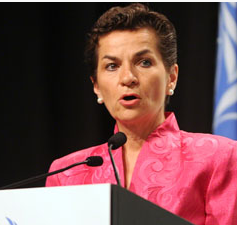Noting that the global media has focused on the failure of the Copenhagen negotiations without recognizing its role in catalyzing future global action, Christiana Figueres, UNFCCC Executive Secretary, stated that there has been “vastly more progress in the international climate change process in the three years since Copenhagen than over the past ten years.”
 24 October 2012: As part of the Lowy Lecture Series in Sydney, Australia, Christiana Figueres, Executive Secretary of the UN Framework Convention on Climate Change (UNFCCC), delivered a speech titled “Global Action on climate change: How the world is responding to the challenge,” in which she sought to correct misconceptions about international and domestic actions to address climate change.
24 October 2012: As part of the Lowy Lecture Series in Sydney, Australia, Christiana Figueres, Executive Secretary of the UN Framework Convention on Climate Change (UNFCCC), delivered a speech titled “Global Action on climate change: How the world is responding to the challenge,” in which she sought to correct misconceptions about international and domestic actions to address climate change.
Noting that the global media has focused on the failure of the Copenhagen negotiations without recognizing its role in catalyzing future global action, Figueres stated that there has been “vastly more progress in the international climate change process in the three years since Copenhagen than over the past ten years.”
She highlighted the agreement among governments on a second commitment period under the Kyoto Protocol as the first step in global action. She pointed to voluntary mitigation pledges by “all industrialized countries and 55 developing countries…covering approximately 80% of global emissions.” She pointed to agreement to adopt a new, universally applicable, legally based agreement by 2015. She acknowledged the complexity of the multilateral process while underscoring that “governments are moving –albeit slowly but consistently – in guiding the transition to a low carbon future.”
Figueres then sought to correct the misconception that “other than Australia, no other country is doing anything at the domestic level” to address climate change. She described voluntary national pledges to reduce emissions in China, the EU, India, New Zealand, the Republic of Korea, Thailand, Singapore and the US.
Figueres also described domestic action on carbon pricing and markets, as well as legislation and policies to transition towards renewable energy and to increase energy efficiency. She pointed to, inter alia: China’s leading role in solar panel manufacturing and installed wind capacity; performance regulations in the power sector and fuel standards in the transport sector in the US; and the inauguration of the Global Green Growth Institute (GGGI) in the Republic of Korea, which aims to drive the green transformation and showcase the potential of green growth. Figueres said such action helps to meet national interests on energy security, realize local health benefits, and gain and maintain international competitiveness and growth opportunities in the low carbon economy.
Emphasizing that Australia is the largest emitter per person of any developed country and the 15th largest emitter in aggregate terms, Figueres stressed Australia’s “responsibility to act,” noting that by taking leadership on climate change, it will reduce its exposure to its impacts, and will gain from “realizing the inevitable shift to a low carbon economy.” [Figueres’ Speech]